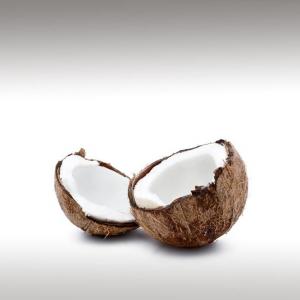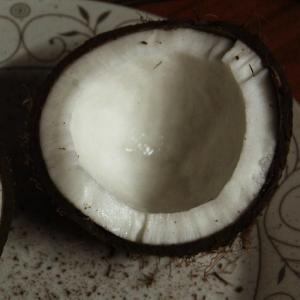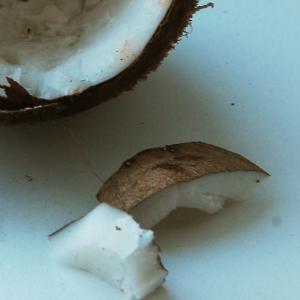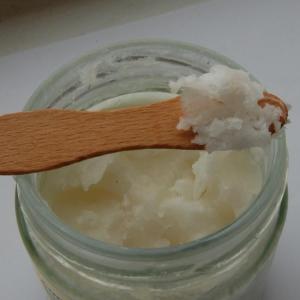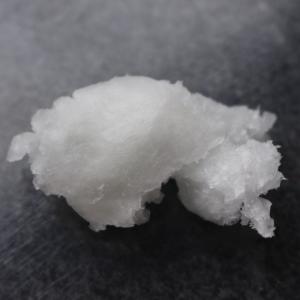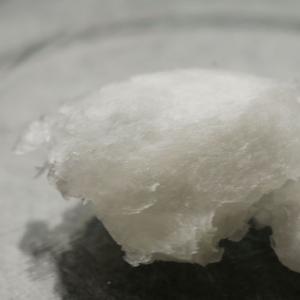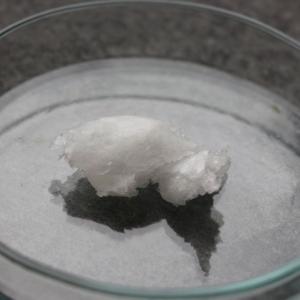
COCONUT NUCIFERA OIL (COCOS NUCIFERA) - BASE OILS

BASE / GENERAL DATA
Information submited: March 11, 2014 Modified: April 4, 2018 By: OperaDreamhouse
Cocos Nucifera is a large palm, growing up to 30 m tall, with
pinnate leaves 4 - 6 m long, and pinnae 60 - 90 cm long: old leaves break
away cleanly, leaving the trunk smooth. 1
Coconuts are generally classified into two general types: tall and dwarf. On very fertile land, a tall Coconut palm tree can yield up to 75 fruits per year, but more often yields less than 30, mainly due to poor cultural practices.
The Coconut palm, is a member of the family Arecaceae (palm family). It is the only accepted species in the genus Cocos. The term Coconut can refer to the entire Coconut palm, the seed, or the fruit, which, botanically, is a drupe, not a nut.
The spelling Cocoanut is an archaic form of the word. The term is derived from 16th-century Portuguese and Spanish Coco, meaning "Head" or "Skull", from the three indentations on the Coconut shell that resemble facial features.Early Spanish explorers called it Coco, which means "Monkey Face" because the three indentations (eyes) on the hairy nut resembles the head and face of a monkey. Nucifera means "Nut-Bearing".
Coconut oil is an edible oil extracted from the kernel or meat of matured Coconuts harvested from the Coconut palm (Cocos nucifera). It has various applications in food, medicine, and industry. Because of its high saturated fat content it is slow to oxidize and, thus, resistant to rancidification, lasting up to two years without spoiling.
This oil found throughout the tropic and subtropic area, the Coconut is known for its great versatility as seen in the many uses of its different parts.
Coconuts are different from any other fruits because they contain a large quantity of "water" and when immature they are known as tender-nuts or jelly-nuts and may be harvested for drinking.
Some Coconut oil products are referred to as “Virgin” Coconut oil. Unlike Olive oil, there is no industry standard for the meaning of “Virgin” Coconut oil. The term has come to mean that the oil is generally unprocessed. For example, Virgin Coconut oil usually has not been bleached, deodorized, or refined.
Virgin Coconut oil can be produced from fresh Coconut meat, milk, or residue. Producing it from the fresh meat involves removing the shell and washing, then either wet-milling or drying the residue, and using a screw press to extract the oil.
Virgin Coconut oil can also be extracted from fresh meat by grating and drying it to a moisture content of 10 - 12%, then using a manual press to extract the oil. Producing it from Coconut milk involves grating the Coconut and mixing it with water, then squeezing out the oil.
The milk can also be fermented for 36 - 48 hours, the oil removed, and the cream heated to remove any remaining oil.
A third option involves using a centrifuge to separate the oil from the other liquids. Coconut oil can also be extracted from the dry residue left over from the production of Coconut milk.
Coconut oil can be extracted through "dry" or "wet" processing. Dry processing requires the meat to be extracted from the shell and dried using fire, sunlight, or kilns to create copra. The copra is pressed or dissolved with solvents, producing the Coconut oil and a high-protein, high-fiber mash.
The all-wet process uses raw Coconut rather than dried copra, and the protein in the Coconut creates an emulsion of oil and water. The more problematic step is breaking up the emulsion to recover the oil. This used to be done by prolonged boiling, but this produces a discolored oil and is not economical; modern techniques use centrifuges and pre-treatments including cold, heat, acids, salts, enzymes, electrolysis, shock waves, or some combination of them. Despite numerous variations and technologies, wet processing is less viable than dry processing due to a 10 - 15% lower yield, even compared to the losses due to spoilage and pests with dry processing.
Coconut oil is composed predominately of medium-chain fatty acids (MCFA), also known as medium-chain triglycerides (MCT).
Coconuts are generally classified into two general types: tall and dwarf. On very fertile land, a tall Coconut palm tree can yield up to 75 fruits per year, but more often yields less than 30, mainly due to poor cultural practices.
The Coconut palm, is a member of the family Arecaceae (palm family). It is the only accepted species in the genus Cocos. The term Coconut can refer to the entire Coconut palm, the seed, or the fruit, which, botanically, is a drupe, not a nut.
The spelling Cocoanut is an archaic form of the word. The term is derived from 16th-century Portuguese and Spanish Coco, meaning "Head" or "Skull", from the three indentations on the Coconut shell that resemble facial features.Early Spanish explorers called it Coco, which means "Monkey Face" because the three indentations (eyes) on the hairy nut resembles the head and face of a monkey. Nucifera means "Nut-Bearing".
Coconut oil is an edible oil extracted from the kernel or meat of matured Coconuts harvested from the Coconut palm (Cocos nucifera). It has various applications in food, medicine, and industry. Because of its high saturated fat content it is slow to oxidize and, thus, resistant to rancidification, lasting up to two years without spoiling.
This oil found throughout the tropic and subtropic area, the Coconut is known for its great versatility as seen in the many uses of its different parts.
Coconuts are different from any other fruits because they contain a large quantity of "water" and when immature they are known as tender-nuts or jelly-nuts and may be harvested for drinking.
Some Coconut oil products are referred to as “Virgin” Coconut oil. Unlike Olive oil, there is no industry standard for the meaning of “Virgin” Coconut oil. The term has come to mean that the oil is generally unprocessed. For example, Virgin Coconut oil usually has not been bleached, deodorized, or refined.
Virgin Coconut oil can be produced from fresh Coconut meat, milk, or residue. Producing it from the fresh meat involves removing the shell and washing, then either wet-milling or drying the residue, and using a screw press to extract the oil.
Virgin Coconut oil can also be extracted from fresh meat by grating and drying it to a moisture content of 10 - 12%, then using a manual press to extract the oil. Producing it from Coconut milk involves grating the Coconut and mixing it with water, then squeezing out the oil.
The milk can also be fermented for 36 - 48 hours, the oil removed, and the cream heated to remove any remaining oil.
A third option involves using a centrifuge to separate the oil from the other liquids. Coconut oil can also be extracted from the dry residue left over from the production of Coconut milk.
Coconut oil can be extracted through "dry" or "wet" processing. Dry processing requires the meat to be extracted from the shell and dried using fire, sunlight, or kilns to create copra. The copra is pressed or dissolved with solvents, producing the Coconut oil and a high-protein, high-fiber mash.
The all-wet process uses raw Coconut rather than dried copra, and the protein in the Coconut creates an emulsion of oil and water. The more problematic step is breaking up the emulsion to recover the oil. This used to be done by prolonged boiling, but this produces a discolored oil and is not economical; modern techniques use centrifuges and pre-treatments including cold, heat, acids, salts, enzymes, electrolysis, shock waves, or some combination of them. Despite numerous variations and technologies, wet processing is less viable than dry processing due to a 10 - 15% lower yield, even compared to the losses due to spoilage and pests with dry processing.
Coconut oil is composed predominately of medium-chain fatty acids (MCFA), also known as medium-chain triglycerides (MCT).

SPIRITUAL PRACTISES DATA

MEDICINE / HEALTH DATA
Information submited: March 11, 2014 Modified: April 4, 2018 By: OperaDreamhouse
Coconut oil used in traditional medicine among Asian and Pacific populations. Pacific Islanders consider Coconut oil to be the cure for all illness. The Coconut palm is so highly valued by them as both a source of food and medicine that it is called "The Tree of Life".
It is very rich in fiber, vitamins, and minerals especially Vitamin E which is known to be a natural antioxidant that helps in fighting free-radicals. Its small molecular structure helps in quick absorption and therefore is excellent for ultimate moist and soft skin. Coconut oil is known to help people with skin conditions such as eczema and psoriasis, as well as keeping acne breakouts in control.
In traditional medicine around the world Coconut is used to treat a wide variety of health problems including the following: abscesses, asthma, baldness, bronchitis, bruises, burns, colds, constipation, cough, dropsy, dysentery, earache, fever, flu, gingivitis, gonorrhea, irregular or painful menstruation, jaundice, kidney stones, lice, malnutrition, nausea, rash, scabies, scurvy, skin infections, sore throat, swelling, syphilis, toothache, tuberculosis, tumors, typhoid, ulcers, upset stomach, weakness, and wounds.
Other qualities of Coconut oil :
Kills viruses that cause influenza, herpes, measles, hepatitis C, SARS, AIDS, and other illnesses.
Kills bacteria that cause ulcers, throat infections, urinary tract infections, gum disease and cavities, pneumonia, and gonorrhea, and other diseases.
Kills fungi and yeasts that cause candidiasis, ringworm, athlete's foot, thrush, diaper rash, and other infections.
Expels or kills tapeworms, lice, giardia, and other parasites.
Provides a nutritional source of quick energy.
Boosts energy and endurance, enhancing physical and athletic performance.
Improves digestion and absorption of other nutrients including vitamins, minerals, and amino acids.
Improves insulin secretion and utilization of blood glucose.
Relieves stress on pancreas and enzyme systems of the body.
Reduces symptoms associated with pancreatitis.
Helps relieve symptoms and reduce health risks associated with diabetes.
Reduces problems associated with malabsorption syndrome and cystic fibrosis.
Improves calcium and magnesium absorption and supports the development of strong bones and teeth.
Helps protect against osteoporosis.
Helps relieve symptoms associated with gallbladder disease.
Relieves symptoms associated with Crohn's disease, ulcerative colitis, and stomach ulcers.
Improves digestion and bowel function.
Relieves pain and irritation caused by hemorrhoids.
Reduces inflammation.
Supports tissue healing and repair.
Supports and aids immune system function.
Helps protect the body from breast, colon, and other cancers.
Is heart healthy; improves cholesterol ratio reducing risk of heart disease.
Protects arteries from injury that causes atherosclerosis and thus protects against heart disease.
Helps prevent periodontal disease and tooth decay.
Functions as a protective antioxidant.
Helps to protect the body from harmful free radicals that promote premature aging and degenerative disease.
Does not deplete the body's antioxidant reserves like other oils do.
Improves utilization of essential fatty acids and protects them from oxidation.
Helps relieve symptoms associated with chronic fatigue syndrome.
Relieves symptoms associated with benign prostatic hyperplasia (prostate enlargement).
Reduces epileptic seizures.
Helps protect against kidney disease and bladder infections.
Dissolves kidney stones.
Helps prevent liver disease.
Supports thyroid function.
Promotes loss of excess weight by increasing metabolic rate.
Is utilized by the body to produce energy in preference to being stored as body fat like other dietary fats.
Helps prevent obesity and overweight problems.
Applied topically helps to form a chemical barrier on the skin to ward of infection.
Reduces symptoms associated the psoriasis, eczema, and dermatitis.
Has no harmful or discomforting side effects.
Is completely non-toxic to humans.
Coconut oil can also be used as sexual lubricant.
Side effects:
Many health organizations advise against the consumption of high amounts of Coconut oil due to its high levels of saturated fat. Many health organizations advise against the consumption of high amounts of Coconut oil due to its high levels of saturated fat.
People who suffer from food allergies, especially tree nut allergies, should consume Coconut with caution. Coconut is considered a tree nut by the U.S. Food and Drug Administration. Manufactured foods that contain Coconut generally carry a warning that the product contains tree nuts. Most people who are allergic to Coconut react to the proteins in the fruit, not the oil. Coconut oil allergies are rare, but may be life-threatening.
Coconut oil contains a large proportion of lauric acid, which is converted to monolaurin in the body, a fat otherwise found only in breast milk.
It is very rich in fiber, vitamins, and minerals especially Vitamin E which is known to be a natural antioxidant that helps in fighting free-radicals. Its small molecular structure helps in quick absorption and therefore is excellent for ultimate moist and soft skin. Coconut oil is known to help people with skin conditions such as eczema and psoriasis, as well as keeping acne breakouts in control.
In traditional medicine around the world Coconut is used to treat a wide variety of health problems including the following: abscesses, asthma, baldness, bronchitis, bruises, burns, colds, constipation, cough, dropsy, dysentery, earache, fever, flu, gingivitis, gonorrhea, irregular or painful menstruation, jaundice, kidney stones, lice, malnutrition, nausea, rash, scabies, scurvy, skin infections, sore throat, swelling, syphilis, toothache, tuberculosis, tumors, typhoid, ulcers, upset stomach, weakness, and wounds.
Other qualities of Coconut oil :
Kills viruses that cause influenza, herpes, measles, hepatitis C, SARS, AIDS, and other illnesses.
Kills bacteria that cause ulcers, throat infections, urinary tract infections, gum disease and cavities, pneumonia, and gonorrhea, and other diseases.
Kills fungi and yeasts that cause candidiasis, ringworm, athlete's foot, thrush, diaper rash, and other infections.
Expels or kills tapeworms, lice, giardia, and other parasites.
Provides a nutritional source of quick energy.
Boosts energy and endurance, enhancing physical and athletic performance.
Improves digestion and absorption of other nutrients including vitamins, minerals, and amino acids.
Improves insulin secretion and utilization of blood glucose.
Relieves stress on pancreas and enzyme systems of the body.
Reduces symptoms associated with pancreatitis.
Helps relieve symptoms and reduce health risks associated with diabetes.
Reduces problems associated with malabsorption syndrome and cystic fibrosis.
Improves calcium and magnesium absorption and supports the development of strong bones and teeth.
Helps protect against osteoporosis.
Helps relieve symptoms associated with gallbladder disease.
Relieves symptoms associated with Crohn's disease, ulcerative colitis, and stomach ulcers.
Improves digestion and bowel function.
Relieves pain and irritation caused by hemorrhoids.
Reduces inflammation.
Supports tissue healing and repair.
Supports and aids immune system function.
Helps protect the body from breast, colon, and other cancers.
Is heart healthy; improves cholesterol ratio reducing risk of heart disease.
Protects arteries from injury that causes atherosclerosis and thus protects against heart disease.
Helps prevent periodontal disease and tooth decay.
Functions as a protective antioxidant.
Helps to protect the body from harmful free radicals that promote premature aging and degenerative disease.
Does not deplete the body's antioxidant reserves like other oils do.
Improves utilization of essential fatty acids and protects them from oxidation.
Helps relieve symptoms associated with chronic fatigue syndrome.
Relieves symptoms associated with benign prostatic hyperplasia (prostate enlargement).
Reduces epileptic seizures.
Helps protect against kidney disease and bladder infections.
Dissolves kidney stones.
Helps prevent liver disease.
Supports thyroid function.
Promotes loss of excess weight by increasing metabolic rate.
Is utilized by the body to produce energy in preference to being stored as body fat like other dietary fats.
Helps prevent obesity and overweight problems.
Applied topically helps to form a chemical barrier on the skin to ward of infection.
Reduces symptoms associated the psoriasis, eczema, and dermatitis.
Has no harmful or discomforting side effects.
Is completely non-toxic to humans.
Coconut oil can also be used as sexual lubricant.
Side effects:
Many health organizations advise against the consumption of high amounts of Coconut oil due to its high levels of saturated fat. Many health organizations advise against the consumption of high amounts of Coconut oil due to its high levels of saturated fat.
People who suffer from food allergies, especially tree nut allergies, should consume Coconut with caution. Coconut is considered a tree nut by the U.S. Food and Drug Administration. Manufactured foods that contain Coconut generally carry a warning that the product contains tree nuts. Most people who are allergic to Coconut react to the proteins in the fruit, not the oil. Coconut oil allergies are rare, but may be life-threatening.
Coconut oil contains a large proportion of lauric acid, which is converted to monolaurin in the body, a fat otherwise found only in breast milk.

BEAUTY / COSMETICS DATA
Information submited: March 11, 2014 Modified: April 3, 2018 By: OperaDreamhouse
Suitable for dry, mature, damaged, dehydrated skin types.
Coconuts are used in the beauty industry in moisturisers and body butters because Coconut oil, due to its chemical structure, is readily absorbed by the skin.
Coconut oil works wonders for dry and damaged skin, cuts, bruises, and speeds the healing while it fights infection. Coconut oil forms a protective barrier to hold in moisture while penetrating into the deeper layers of the skin to helping to keep connective tissues strong and supple. Coconut oil is readily absorbed into the skin, helping to reduce the appearance of fine lines and wrinkles.
This oil also strengthens by holding your skin tissues together and protects the skin from the harmful UV rays of the sun. The antiseptic composition of Coconut oil kills fungi and yeast that cause athlete's foot, diaper rash, and candidiasis.
It aids in exfoliating the outer layer of dead skin cells, making the skin smoother. Coconut oil is used to treat dry and damaged hair and is a lathering ingredient for natural shampoos and soaps. Soap made with Coconut oil tends to be hard, although it retains more water than those made with other oils and therefore increases manufacturer yields.
Other qualities of Coconut oil:
Supports the natural chemical balance of the skin.
Softens skin and helps relieve dryness and flaking.
Prevents wrinkles, sagging skin, and age spots.
Promotes healthy looking hair and complexion.
Helps control dandruff.
Coconuts are used in the beauty industry in moisturisers and body butters because Coconut oil, due to its chemical structure, is readily absorbed by the skin.
Coconut oil works wonders for dry and damaged skin, cuts, bruises, and speeds the healing while it fights infection. Coconut oil forms a protective barrier to hold in moisture while penetrating into the deeper layers of the skin to helping to keep connective tissues strong and supple. Coconut oil is readily absorbed into the skin, helping to reduce the appearance of fine lines and wrinkles.
This oil also strengthens by holding your skin tissues together and protects the skin from the harmful UV rays of the sun. The antiseptic composition of Coconut oil kills fungi and yeast that cause athlete's foot, diaper rash, and candidiasis.
It aids in exfoliating the outer layer of dead skin cells, making the skin smoother. Coconut oil is used to treat dry and damaged hair and is a lathering ingredient for natural shampoos and soaps. Soap made with Coconut oil tends to be hard, although it retains more water than those made with other oils and therefore increases manufacturer yields.
Other qualities of Coconut oil:
Supports the natural chemical balance of the skin.
Softens skin and helps relieve dryness and flaking.
Prevents wrinkles, sagging skin, and age spots.
Promotes healthy looking hair and complexion.
Helps control dandruff.

FOOD / COOKING DATA
Information submited: March 11, 2014 Modified: April 4, 2018 By: OperaDreamhouse
Coconut oil is commonly used in cooking, especially for frying and is a common flavor in many South Asian curries. It has been used for cooking for thousands of years.
Coconut is highly nutritious and rich in fiber, vitamins, and minerals. It is classified as a "functional food" because it provides many health benefits beyond its nutritional content.
Coconut oil can be used to fry foods, make a healthier mayonnaise, or used in baked goods. When you make pastries, substitute 50% Coconut oil for whatever fat is recommended.
It can be used in liquid form as would other vegetable oils, or in solid form as would butter or lard.
Coconuts are part of the daily diets of many people. It is lower in calories than all other fats. This oil is of special interest because it possesses healing properties far beyond that of any other dietary oil.
In recent years, Virgin Coconut oil has become increasingly popular in health and natural food circles and with vegans. It was described as having a "haunting, nutty," flavor that also has a touch of sweetness, which works well in baked goods, pastries, and sautés.
The smell of Coconuts comes from the 6-pentyloxan-2-one molecule, known as delta-decalactone in the food and fragrance industries.
Other culinary uses include replacing solid fats produced through hydrogenation in baked and confectionery goods.
Hydrogenated or partially hydrogenated Coconut oil is often used in non-dairy creamers, and snack foods including popcorn. Hydrogenated Coconut oil is also sold in Australia under the brand-name Copha and is the main ingredient in Australian snacks such as, Chocolate crackles and White Christmas.
The smoke point of Coconut oil is 177 °C (351 °F).
Does not form harmful by-products when heated to normal cooking temperature like other vegetable oils do.
Coconut is highly nutritious and rich in fiber, vitamins, and minerals. It is classified as a "functional food" because it provides many health benefits beyond its nutritional content.
Coconut oil can be used to fry foods, make a healthier mayonnaise, or used in baked goods. When you make pastries, substitute 50% Coconut oil for whatever fat is recommended.
It can be used in liquid form as would other vegetable oils, or in solid form as would butter or lard.
Coconuts are part of the daily diets of many people. It is lower in calories than all other fats. This oil is of special interest because it possesses healing properties far beyond that of any other dietary oil.
In recent years, Virgin Coconut oil has become increasingly popular in health and natural food circles and with vegans. It was described as having a "haunting, nutty," flavor that also has a touch of sweetness, which works well in baked goods, pastries, and sautés.
The smell of Coconuts comes from the 6-pentyloxan-2-one molecule, known as delta-decalactone in the food and fragrance industries.
Other culinary uses include replacing solid fats produced through hydrogenation in baked and confectionery goods.
Hydrogenated or partially hydrogenated Coconut oil is often used in non-dairy creamers, and snack foods including popcorn. Hydrogenated Coconut oil is also sold in Australia under the brand-name Copha and is the main ingredient in Australian snacks such as, Chocolate crackles and White Christmas.
The smoke point of Coconut oil is 177 °C (351 °F).
Does not form harmful by-products when heated to normal cooking temperature like other vegetable oils do.
COMMENTS
No comments.
Newest mixtures containing Coconut Nucifera Oil (Cocos Nucifera):

Face and body gentle oil cleanser
May 26, 2016

Summer time body moisturizer
August 5, 2015

Homemade White Tiger Balm (karpura)
July 30, 2015

Home made toothpaste
June 4, 2015

Therapeutic body balm for insect bite healing
June 3, 2015

Scalp treatment with coconut oil
June 2, 2015

Home made Golden milk
May 12, 2015

Homemade coconut butter
March 9, 2015

Massage oil recipe for pain relief
March 8, 2015

Skin healing balm for winter season
February 23, 2015

Silky summer legs scrub
February 6, 2015

Nourishing body butter
February 4, 2015


